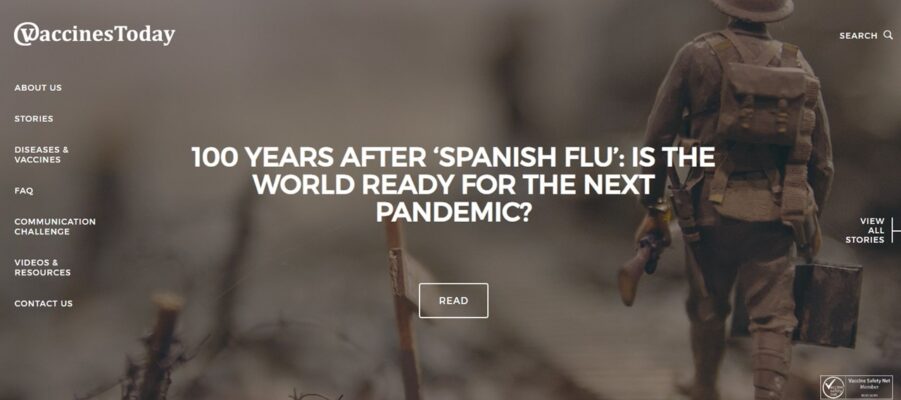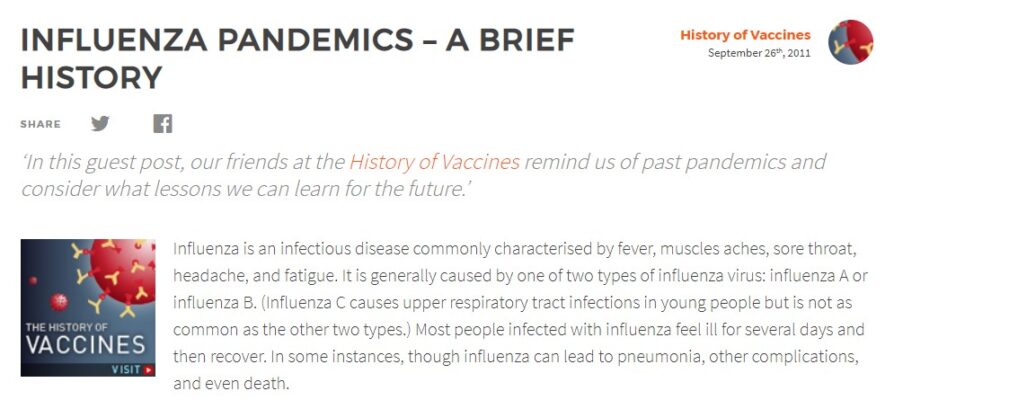The next pandemic is coming. We don’t know exactly where or when, but experts agree that outbreaks of new diseases are inevitable.

Our 2018 article marking the 100 year anniversary of the ‘Spanish flu’ pandemic was not an uncanny prediction. It simply reflected the consensus that pandemics – of varying severity – occur several times per century. [The article was, however, wildly popular in spring 2020.]
In the 100 years since the 1918 flu pandemic, there had been four influenza pandemics: 1957-1958, 1968-1969, 1977-1978, and 2009-2010. COVID-19 felt shocking and unprecedented to many people, but historians can point to plenty of past examples of outbreaks, while global travel provides a route for the rapid spread of new diseases.

In fact, the 2011 film Contagion is based on a new viral disease emerging in Asia, initially spread from animals to humans. It is full of now-familiar terms such as ‘social distancing’, ‘contact tracing’ and ‘the R number’. (Spoilers: Kate Winslet is the save-the-day scientist while Gweneth Paltrow succumbs to the disease early in the film, but not before carrying the bug from Asia to the US.)
Flu, chikungunya, Nipah virus, Dengue fever, monkeypox – there are plenty of viruses waiting in the wings with the potential to change and spread quickly. Climate change and the disruption of animal habitats threaten to increase the risk of outbreaks, including of diseases spread by mosquitoes. As we begin to look beyond COVID-19, the question is not whether this could happen again, but what we will do when it does.
Vaccines Today was founded in the wake of the H1N1 pandemic. Our archive is packed with pieces reflecting on how the world responds to pandemics. The EU, ECDC and WHO all issued in-depth reports calling for better pandemic preparedness planning, improved communication, and greater capacity to develop and manufacture vaccines.
Some of the same conclusions are emerging as experts and institutions begin to reflect on how the world handled the COVID crisis. The EU wants a stronger ‘Health Union’ to improve its preparedness for pandemics. ‘The key lesson learned from the COVID-19 crisis is the need to transform the ad hoc solutions that were used to deal with the crisis into permanent structures that will allow us to be better prepared in future,’ said Stella Kyriakides, European Commissioner for health. ‘Emergency action must become structural capacity.’
Reports commissioned by the WHO highlighted shortcomings by the Organization and governments, and made a series of recommendations on topics ranging from vaccines to the timing of declaring a global pandemic.
Dr Tedros Adhanom Ghebreyesus, WHO Director General, said calls for an international treaty on pandemic preparedness was the most significant recommendation. ‘This is an idea whose time has come,’ he said.
The last time the WHO and its member states agreed a global treaty of this kind was part of its tobacco control efforts. Nailing down the fine details of that agreement took four years and the debate has already begun on how a pandemic treaty would operate and be funded.
Dr Bram Palache, flu scientist and co-founder of the European Scientific Working Group on Influenza (ESWI), would prefer to see a group of global experts responsible for coordinating global pandemic preparedness –separate from the WHO.
‘What we need is a global governance structure with, perhaps, 10 independent experts, responsible for emerging pandemics,’ he told Vaccines Today. ‘This group would identify gaps and needs, coordinate real-time surveillance, and develop an action plan in collaboration with the WHO and governments.’
Dr Palache said the problem with past pandemic preparedness exercises was a lack of alignment and accountability for taking action to address shortcomings. ‘Many of the things we’ve seen during the COVID-19 pandemic were not unexpected but we just didn’t know how to deal with them,’ he said. ‘A global steering group with secure funding could coordinate between institutions and governments, and identify areas for research and innovation. It would also look at the production and distribution of vaccines and antiviral medicines.’

Perhaps the closest existing organisation to the body proposed by Dr Palache is CEPI –the Coalition for Epidemic Preparedness Innovations. Founded in 2017, it was tasked with tackling diseases such as Chikungunya and the Middle East Respiratory Syndrome (MERS), as well as a hypothetical ‘Disease X’. CEPI says that while COVID-19 was the first contagious illness to fit the description of a Disease X, others may be around the corner.
CEPI has worked with GAVI and the WHO to create COVAX, a global collaboration working for equitable access to COVID-19 vaccination. To date, COVAX has delivered hundreds of millions of doses of vaccine to lower and middle-income countries, but has struggled to match supply with demand.
Its success or failure may determine not only how quickly the global pandemic comes under control, but how the world reflects on how well vaccine distribution was managed. It may be some time before it is clear whether the best approach to pandemic preparedness is to strengthen existing global health structures or create new ones.




